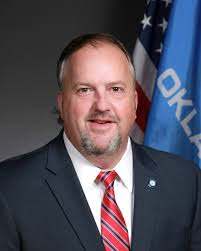Study of ODOT Inspection Fees and Services Projects Slated
Mike Seals - September 10, 2020 10:37 am

OKLAHOMA CITY – State Rep. Lonnie Sims, R-Jenks, hosted an interim study Wednesday focused on the cost of construction management services and inspection fees for federally funded local government projects let by the Oklahoma Department of Transportation (ODOT).
“We brought local planning, government and state transportation stakeholders together to analyze the use of third-party inspection service providers and the significant cost differences when used in lieu of in-house ODOT or local inspection staffs,” Sims said. “One current example is a walking trail rehabilitation project in Jenks where the third-party inspection costs are accounting for more than 27% of total project costs, or $73,000 of the $261,000 project.”
“This is a walking trail,” Sims added. “We basically are reclaiming ground lost to grass encroachment and laying new asphalt. There is no way inspection services should cost $70,000, nor could these services not be handled by local engineering expertise resulting in significant savings to the greater benefit of our local Oklahoma communities.”
Prior to 2014, local governments were able to do construction management and inspection services for these types of projects. Commonly referred to as Transportation Alternative Projects (TAP), inspection costs typically ranged between 6% and 8% of the total project costs. However, with an increasing tendency to contract with third-party service providers, especially when the total project costs are less than $1 million, costs have ballooned to an average of more than 15% and have ranged as high as 29%.
“We have to bring some balance and financial responsibility back to this process,” Sims said. “To be fair to ODOT, they are subject to some very rigid requirements or strings that come attached to these federal funding dollars. However, when local officials learn they have to come up with another 19%, as in the case of Jenks, it is very difficult to square that decision knowing how bad that $50,000 is needed to fund other community priorities.”
Oklahoma Department of Transportation Secretary Tim Gatz acknowledged this is just one area they will be evaluating further as well as appealing to Oklahoma’s federal delegation for greater flexibility in future transportation legislation to allow use of local resources on lower risk projects like TAP.
“I believe there is a big win here for everyone, but most importantly the Oklahoma taxpayers,” Sims said. “I am extremely grateful for all the stakeholders who participated today, and recognize the opportunity to maximize the use of these funds going forward.”
In addition to Secretary Gatz, additional speakers at the study included Viplava Putta, director of Transportation and Planning for The Indian Nations Council of Governments (INCOG); Jenks Assistant City Manager Robert Carr; Broken Arrow Assistant City Manager Kenny Schwab; Mike Fina with the Oklahoma Municipal League; and Paul Green Sr., a transportation engineer with Freese and Nichols.



